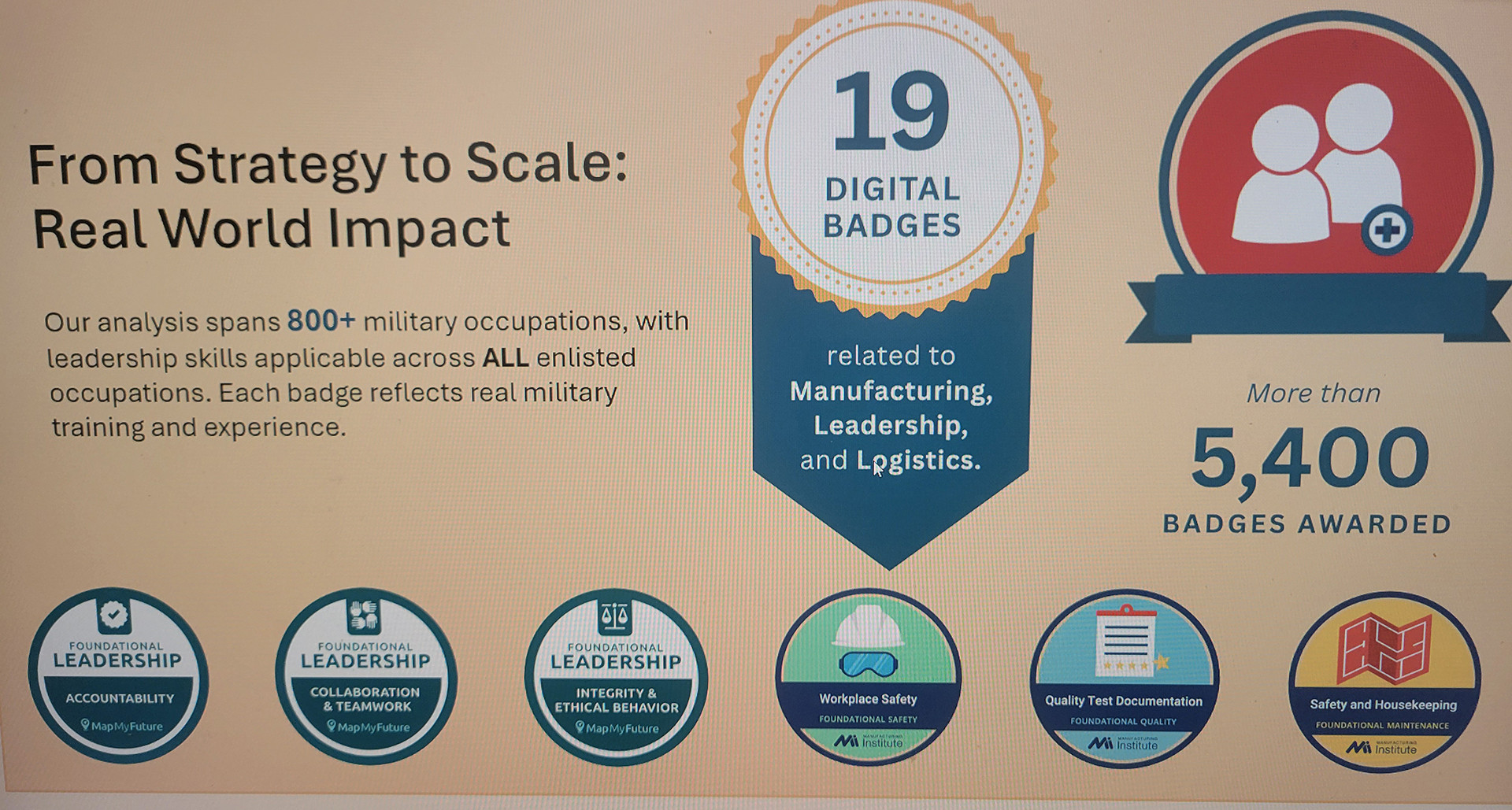
Task Force Movement meeting extols continuing progress on getting military-connected community into careers.
The Task Force Movement (TFM) Advisory Board and its partners held its latest meeting July 23 in New Orleans. Nearly three-and-a-half years old, the public-private partnership focused on getting the military-connected community into in-demand career fields maintains a steering committee The American Legion holds a seat on.
The task force has grown in reach from its start in trucking, into health and the defense industrial base, on into cybersecurity and AI. And beyond individual companies, unions have been more proactive in recent years in recruiting and training veterans; representatives of several were on hand to talk about the progress of apprenticeship programs, which are training future employees in every kind of energy from fossil to renewable to nuclear. Gas Workers Union Local 18007 in Chicago alone has placed around 800 veterans in jobs since beginning its program.
Martin Helms, executive director of the construction industry’s Helmets to Hardhats program, said the trades are appealing to the sizable number of veterans who don’t want to go the four-year-college route. An emphasis right now is getting information down to locals to meeting the growing demand. Involvement continues to rise, he said, and “we keep nibbling away at it … to make it a little better.” Frank Christensen, a TFM Senior Advisory Board member and general president of the International Union of Elevator Constructors, added that “unions learn from one another” to make their offerings better, all with the goal of helping veterans “reintegrate with dignity and stability …. This isn’t just a job.”
"When I was asked to join the advisory board, I didn’t hesitate," Christensen continued. "I knew the union voice needed to be present, not just to support veterans but to collaborate and learn from others who are equally invested in their success. Like the labor movement, Task Force Movement is nonpartisan. We must work with every administration to get the job done. Supporting veterans is not about politics. It’s about duty. It’s about impact. And that’s something we all have a stake in."
The defense industrial base (DIB) – which includes everything from welding to shipbuilding – is currently encountering the changes that come with a new administration and its new budget priorities; but as TFM Maritime Committee Chairman and Maritime Institute VP of Operation Ed Lewis put it, “the Navy and Coast Guard are always building something.” Construction orders for new commercial deepwater ships are on the rise, and veteran apprenticeships within the DIB are hard at work making matches to get them built.
TFM Senior Advisory Board member Lisa Lutz, CEO of Solutions for Information Design (SOLID), offered progress on MapMyFuture, a pilot program to convert career capital acquired during military service – skills, competencies, achievements – into easily identified and portable digital badges a veteran can carry into the job market. The first U.S. manufacturer to actively adopt and integrate these badges is Anheuser-Busch, and Lutz said they can be used as a blueprint for other manufacturers. Meanwhile, Lori Adams, senior policy director for the National Association of State Workforce Agencies, informed the group about the National Labor Exchange’s dedicated portal for state-by-state veteran resources.
In the middle of the panel on the state of veteran-friendly efforts in the trucking industry, the Dixon Center for Military and Veterans Services signed a memorandum of understanding for future initiatives with the FASTPORT career-placement company; Dixon VP Army Col. (ret.) Sam Whitehurst is on the TFM Executive Committee. “TFM is all about coalitions,” Whitehurst stated, and that continues to be evident in trucking. One new coalition, in New Jersey, will teach students at three state community colleges how to become independent trucking entrepreneurs. It was spearheaded by frequent TFM partner Teresa Watson, founder/CEO of the Minority Professional Trucking Association; the first cohort is set to graduate in October.
The cybersecurity and artificial intelligence (AI) fields are ever-developing. TFM’s senior adviser for the two is Christopher Etesse, CEO of Fusion Cyber. To close out the meeting, he told the group about the launch that day of the Trump administration’s revamped ai.gov. The site includes a plan with more than 90 separate federal policy actions. A primary emphasis is education and the importance of getting the next generation of U.S. workers interested in – and savvy to – AI. Etesse said the field is developing so rapidly that training needs to focus not on curriculums but iterations. Fusion Cyber offers AI scholarships across the country, including to JROTC units. Another avenue mentioned is the DRIVE (Develop, Redistribute, Improve, Vault, Expose) program of the Air Force Civilian Service; it was established to assist those medically disqualified from basic training to gain employment and serve in a civilian capacity.
- Careers

